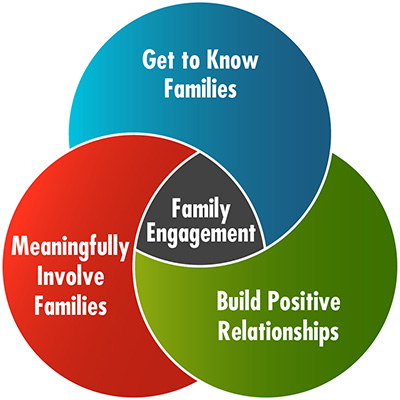Family Engagement: Collaborating with Families of Students with Disabilities
Wrap Up
As you have learned, family engagement—sometimes referred to as parent involvement or family-school partnership—is a practice in which educators and families work together to support and improve the learning and development of children. Family engagement is especially important for students with disabilities, inasmuch as their families can help facilitate their children’s overall development and promote the continuity of services, interventions, and practices between home and school.
Although most parents of children with disabilities consider a good education for their child to be important, at times they may be less engaged than the parents of other students for various reasons. To actively engage these families, educators can take the following actions.
 Get to know families—Educators need to understand that the parents of children with disabilities may be experiencing a wide range of emotions, taking on additional roles (e.g., navigating insurance coverage, coordinating services for their child), and dealing with stressors related to daily living. When educators understand the composition, challenges, and experiences of families, they are better able to offer meaningful support.
Get to know families—Educators need to understand that the parents of children with disabilities may be experiencing a wide range of emotions, taking on additional roles (e.g., navigating insurance coverage, coordinating services for their child), and dealing with stressors related to daily living. When educators understand the composition, challenges, and experiences of families, they are better able to offer meaningful support.
Build positive relationships—Educators can build positive relationships with families by creating a welcoming environment, acknowledging children and families’ strengths, developing trust, and recognizing families as ultimate decision makers for their child. In a school’s efforts to meaningfully engage parents, the importance of building positive trusting relationships cannot be overstated. It is critical to ensuring the success of students and the increased engagement of families.
Meaningfully involve families—Families should have the opportunity to be involved in their child’s education in a way that is meaningful to them. This involvement can take many forms: parenting, communicating, volunteering, learning, school decision making, and collaborating with the community. Educators must be willing to work with all families and accept the ways that they choose to be involved.
Listen to Luz Hernandez share some words of wisdom for professionals who work with families who have a child with a disability (time: 1:13).

Luz A. Hernandez
Parent of a young adult with a disability
Executive Director, Hispanos Unidos Para
Niños Excepcionales (HUNE)
Transcript: Luz A. Hernandez
My words of wisdom to school personnel, quite honestly, is listen to families. Try to understand where they are coming from. Realize that everyone has different needs. And yet families know their children very well, and they need to respect and use the families so that they can appropriately educate their children, so that families can feel more as a part of the school and be more willing to go to those meetings at the school. It’s how they’re welcomed. If they’re parents who have limited English proficiency, they need to make accommodations for them. If they’re families that have children with different disabilities or differently-abled, they need to acknowledge that and really try to help them, maybe not even only with school issues, but have at least resources available for families that can help them out in other ways so that they can be a stronger family and ultimately be able to advocate and assist the schools as well.
Revisiting Initial Thoughts
Think back to your initial responses to the following questions. After working through the resources in this module, do you agree with your Initial Thoughts? If not, what aspects of your answers would you change?
What do educators need to understand about families of children with disabilities?
How can educators engage these families?
When you are ready, proceed to the Assessment section.